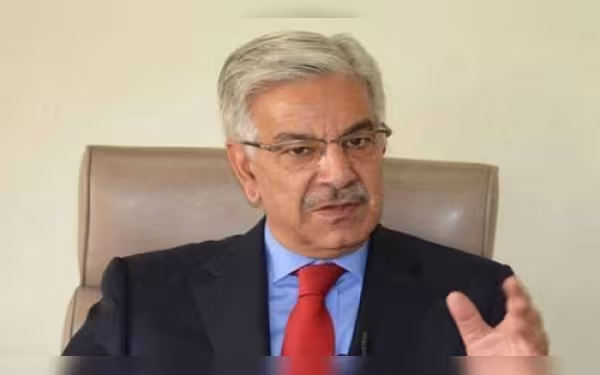Monday, November 25, 2024 01:32 AM
Khawaja Asif Rules Out Talks with PTI Amid Internal Strife
- Khawaja Asif denies any talks with PTI.
- Internal divisions within PTI highlighted by Asif.
- Asif criticizes PTI's leadership and actions.
 Image Credits: dailytimes_pk
Image Credits: dailytimes_pkKhawaja Asif clarifies no talks with PTI, citing internal divisions and criticizing leadership amid ongoing political tensions.
In a recent press conference held in Islamabad, Defence Minister Khawaja Asif made it clear that the government is not engaging in any discussions with the opposition party, Pakistan Tehreek-e-Insaf (PTI). This statement comes amid rising tensions and internal conflicts within PTI, particularly concerning its founder, Imran Khan, who is currently imprisoned. Asif emphasized that there is no communication or negotiations occurring between the government and PTI, suggesting that some members of the party may prefer Khan to remain behind bars.
Asif pointed out the divisions within PTI, stating, "There is a rift between PTI members, with some wanting Imran Khan to remain in jail." This internal strife appears to be a significant factor in the party's current predicament. The Defence Minister did not hold back in his criticism of PTI, labeling their actions as "hypocrisy," especially in light of a controversial incident involving Imran Khan's wife, Bushra Bibi. He accused her of selling a gift from Saudi Arabia, calling the act "disgraceful" and highlighting the importance of Pakistan's relationship with the kingdom.
"The statement made by Bushra Bibi about Saudi Arabia was unfortunate," Asif remarked, adding that she sold a watch given by a country with which Pakistan shares deep historical ties. He noted that many Pakistani workers are employed in Saudi Arabia, contributing significantly to the country's economy through remittances. This situation raises questions about the integrity of PTI's leadership and their commitment to the nation's interests.
Furthermore, Khawaja Asif described PTI as being embroiled in a "family feud," with several party members, including three women, at odds with Bushra Bibi. He mentioned an audio recording in which Bibi is heard reprimanding staff about the movement of goods, suggesting that there are deeper issues at play within the party. Asif stated, "Those who make false claims about religion and faith have children raised by Zionists," indicating a strong disapproval of PTI's leadership and their alleged double standards.
Asif's remarks extended to the broader implications of PTI's actions, accusing the party of engaging in divisive tactics to maintain their political relevance. He criticized their approach to politics, particularly regarding corruption, and claimed that the party's leadership is experiencing a "moral bankruptcy." This assertion raises concerns about the ethical standards within PTI and their ability to govern effectively.
On the security front, Khawaja Asif condemned the ongoing violence in Khyber Pakhtunkhwa province, urging the provincial government to take decisive action against terrorism. He criticized the provincial leadership for focusing on blaming the federal government while neglecting their responsibilities towards local security. This call to action highlights the urgent need for a unified approach to tackle the security challenges facing the country.
Asif also expressed apprehensions regarding the state of Pakistan's foreign policy, particularly in light of the shifting allegiances among PTI members. He noted, "First, they rejected American influence, and now they are accepting it," suggesting a lack of consistency in their political stance. This inconsistency could have far-reaching implications for Pakistan's international relations.
Khawaja Asif's statements reflect a complex political landscape in Pakistan, characterized by internal divisions within PTI and ongoing security challenges. As the government navigates these turbulent waters, it remains crucial for all political parties to prioritize the nation's interests over personal or party agendas. The future of Pakistan's political stability may depend on the ability of its leaders to unite and address the pressing issues facing the country.













